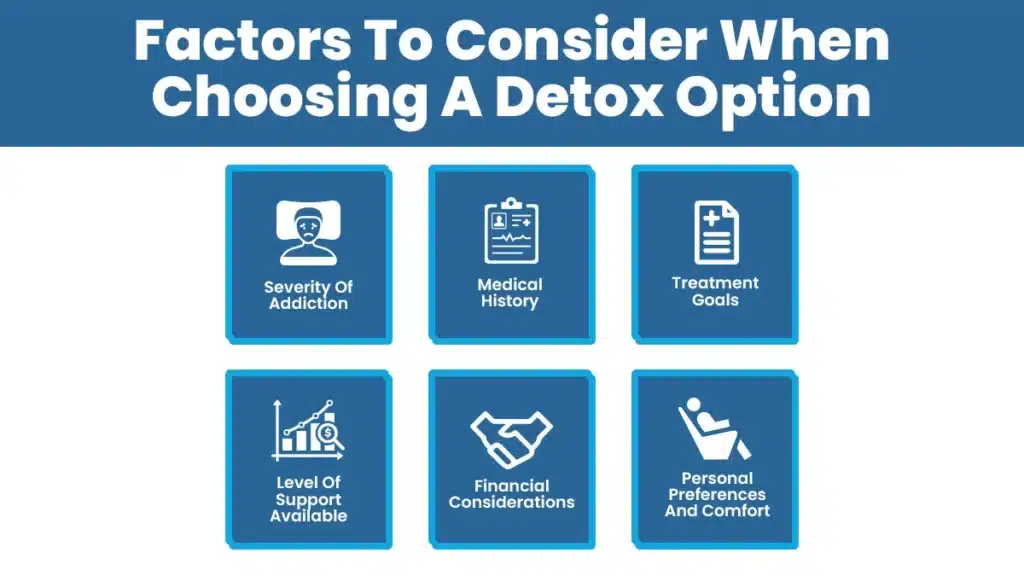Opioid addiction is a complex and challenging issue affecting millions of individuals across the United States. Whether stemming from prescription painkillers or illicit substances like heroin, breaking free from opioid dependence often requires a structured detoxification process.
However, navigating the array of detox options available can be overwhelming, leaving many unsure of where to begin their journey. This article delves into the various opioid detox options, helping you make informed decisions about the best path forward on your road to recovery.
Key Takeaways
Opioid detox is an important step in overcoming substance abuse and reclaiming control of one’s life. Here is what you need to know:
- Opioid detox involves safely managing withdrawal symptoms while preparing for further medical treatment.
- Different opioid detox options are available, offering varying levels of support and treatment modalities.
- When choosing an opioid detox option, it’s necessary to consider factors such as the intensity of addiction.
The Haven Detox-South Florida offers compassionate care to help individuals overcome substance use disorder (SUD). Dial (561) 328-8627 for more details.

Understanding Opioid Detox
Opioids are a type of drug that includes both legal medications, like prescription painkillers, and illegal drugs, like heroin. They work by binding to specific receptors in the brain, reducing feelings of pain and increasing pleasure. Legal opioids, such as oxycodone and hydrocodone, are often prescribed by doctors to manage severe pain, while illegal opioids, like heroin, are often used recreationally.
Opioid detox is a process where someone who has become dependent on opioids stops using them under medical supervision. This process can be challenging because opioid drugs can cause strong physical and psychological dependence. When someone stops using opioids suddenly, they can experience withdrawal symptoms such as nausea, muscle aches, and anxiety.
During detox, medical professionals may provide medications to help ease opioid withdrawal symptoms and manage cravings. These medications can help lessen the discomfort of withdrawal and increase the chances of completing detox. In addition to medicines, individuals undergoing detox may receive therapy and support to address the underlying causes of their opioid use and develop strategies for maintaining sobriety.
Overall, opioid detox is a crucial step for individuals looking to break free from opioid addiction and start on the path to recovery. It involves medical support, counseling, and a commitment to positive lifestyle changes. By undergoing detox and participating in ongoing treatment, people can regain control of their lives and work towards a healthier future.
Available Opioid Detox Options
When it comes to opioid detox, there are various options available, each with its own set of procedures, benefits, and drawbacks. Let’s explore the different types of opioid detox options:
Medical Detoxification
Medical detoxification is a supervised process aimed at helping individuals safely withdraw from opioids and opiates. It involves the use of medicines to manage symptoms of withdrawal and ensure a smoother transition to sobriety. The prime purpose of medical detox is to stabilize the individual physically and emotionally while preparing them for ongoing addiction treatment.
During medical detox, individuals receive 24/7 medical supervision to monitor their vital signs and manage any possible complications. FDA-approved medications commonly used in medical detox include methadone, buprenorphine, and naltrexone, which help alleviate withdrawal symptoms and reduce cravings.
While medical detox offers the benefit of professional supervision and medical intervention, it may also come with drawbacks, such as the risk of developing a dependence on detox medications and the potential for withdrawal symptoms once detox is completed.
Inpatient Detox Programs
Inpatient detox programs offer a structured and supportive environment for individuals undergoing opioid detoxification. These programs typically occur in specialized treatment centers or hospitals, where patients receive around-the-clock care from medical staff.
The duration of inpatient detox programs varies depending on the individual’s needs and progress. Treatment may last anywhere from a few days to several weeks. In addition to medical supervision, patients can access various support services, including counseling, therapy, and educational resources.
While inpatient detox programs offer comprehensive care and a supportive environment, they may require individuals to take time away from their daily lives and responsibilities. Additionally, these programs can be costly and inaccessible to everyone.
Outpatient Detox Programs
Outpatient detox programs provide a more flexible approach to opioid detoxification, allowing individuals to receive treatment while maintaining their daily obligations. These programs usually involve regular rehab or clinic visits for medical monitoring and support.
The duration of outpatient detox programs varies based on the severity of addiction and individual progress. Treatment may involve medication management, counseling, and support group participation. Outpatient programs’ flexibility makes them accessible to individuals who cannot commit to inpatient treatment due to work, family, or other obligations.
While outpatient detox programs offer convenience and flexibility, they may not provide the same supervision and support as inpatient programs. Additionally, individuals with severe addiction or co-occurring mental health conditions may need more intensive treatment than outpatient programs can offer.
Rapid Detoxification
Rapid detoxification is a method of detoxification that involves administering opioid-blocking medications under anesthesia to accelerate the withdrawal process. The goal is to shorten the duration of withdrawal symptoms and minimize discomfort for individuals undergoing detoxification.
While rapid detoxification may offer a quicker path to sobriety, it carries significant safety concerns and controversies. The use of anesthesia poses risks, including respiratory depression, aspiration, and cardiac complications. Additionally, the effectiveness of rapid detox compared to traditional methods is unclear, and some studies suggest that rapid detox may not reduce the risk of relapse.
Before opting for rapid detox, individuals should carefully consider the potential risks and benefits and consult with healthcare professionals. Alternative detox methods, such as medically supervised detox or outpatient programs, may offer safer and more effective options for opioid withdrawal.
Holistic Detox Approaches
Holistic detox approaches focus on treating the whole person’s mind, body, and spirit. To promote healing and recovery from opioid addiction. These approaches incorporate various techniques and therapies, including acupuncture, yoga, meditation, nutritional therapy, and massage therapy.
By addressing the underlying causes of addiction and promoting overall well-being, holistic detox approaches aim to support individuals in achieving lasting sobriety. These approaches recognize the importance of the mind-body connection in recovery and emphasize self-care, stress management, and healthy lifestyle choices.
Holistic detox approaches can be integrated with other treatment options, such as medication-assisted treatment (MAT), to provide a comprehensive approach to addiction recovery. While holistic detox may not be suitable for everyone, it offers alternative options for individuals seeking a more holistic approach to detoxification and recovery.
Factors To Consider When Choosing A Detox Option
When it comes to choosing the right detox option for opioid addiction, several factors need to be carefully considered. Let’s explore some essential considerations:
Severity Of Addiction
The severity of drug use disorder plays a crucial part in determining the appropriate detox option. For individuals with a long history of opioid use or those who have experienced multiple relapses, a more intensive detox program, such as inpatient treatment, may be necessary to provide the level of support needed to manage symptoms of opioid withdrawal safely.
Medical History
A thorough understanding of one’s medical history is essential when selecting a detox option. Certain medical conditions or medicines may impact the suitability of specific detox methods. It’s vital to disclose any relevant medical information to health professionals to ensure the safety and effectiveness of the chosen detox approach.
Level Of Support Available
The level of support available during the detox process can significantly influence its success. Having a strong support system of family, friends, or healthcare professionals can provide invaluable encouragement and assistance throughout the detox journey. Consideration should be given to the availability of support both during and after detoxification.
Financial Considerations
Financial considerations are another vital factor to weigh when choosing a detox option. The cost of detox programs can vary significantly depending on factors such as the type of treatment program, duration, and level of care provided. Exploring different payment options, including insurance coverage, is essential to ensure affordability and accessibility.
Treatment Goals
Individual treatment goals and objectives should be considered when selecting a detox option. Whether the primary goal is to achieve sobriety, manage withdrawal symptoms, or address underlying issues contributing to addiction, choosing a detox approach that aligns with these goals is essential for long-term success.
Personal Preferences And Comfort
Finally, personal preferences and comfort should be considered when choosing a detox option. The treatment setting, amenities, and therapeutic approaches can vary between detox programs. Choosing a detox option that feels comfortable and conducive to one’s overall well-being and recovery journey is essential.
By considering these factors and consulting with healthcare professionals, you can make informed decisions supporting your recovery journey.
Frequently Asked Questions (FAQ)
Opioid detox can bring several side effects and withdrawal symptoms, including nausea, vomiting, diarrhea, muscle pain, insomnia, anxiety, and agitation. People may also experience sweating, chills, yawning, and a runny nose. These symptoms can be painful but are typically not life-threatening.
However, in severe cases, opioid withdrawal can lead to dehydration or electrolyte imbalances. Seeking medical supervision during detox can help manage these symptoms safely. It’s important to note that the severity of withdrawal can vary depending on factors like the type of opioid used, duration of use, and individual health.
After opioid detox, staying sober requires commitment and support. Surround yourself with positive influences and prevent triggers. Attend support groups like Narcotics Anonymous (NA) for encouragement and accountability. Develop healthy habits like regular exercise, balanced nutrition, and sufficient sleep to boost your well-being.
Practice stress-relief techniques such as meditation or deep breathing to manage cravings. Keep busy with hobbies or volunteer work to occupy your mind. Create a relapse prevention plan with coping strategies for challenging situations. Stay connected with friends and family members who understand and support your recovery journey.
While most opioid withdrawal symptoms are uncomfortable but not life-threatening, severe cases can pose risks. Dehydration from vomiting and diarrhea is a concern, potentially leading to electrolyte imbalances or kidney problems. In rare instances, individuals may experience severe hypertension, rapid heart rate, or seizures, which can be life-threatening.
Delirium, a state of confusion and disorientation, may also occur in extreme cases. Seeking medical supervision during detox is crucial, especially for those with pre-existing health conditions or a history of severe withdrawal symptoms. Prompt medical attention can help manage these risks and ensure a safer detoxification process.
Transform Your Life With The Haven Detox-South Florida
Are you feeling trapped in the cycle of opioid use disorder (OUD)? There’s hope for a brighter, drug-free future, and it starts with seeking treatment at The Haven Detox-South Florida.
Starting with our medical detox program, we’ll help your body rid itself of harmful toxins, paving the way for further treatment. From there, you’ll transition into our residential rehab program, receiving round-the-clock care and support. Engage in therapy sessions, receive medication, and benefit from innovative treatments like NAD IV therapy to heal both your body and mind.
Don’t wait to take the first step toward healing. Your future is too important to put off any longer. Call us at (561) 328-8627 today for more information.








